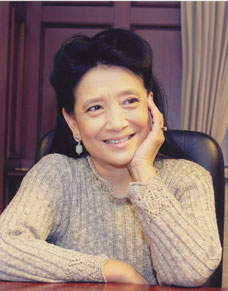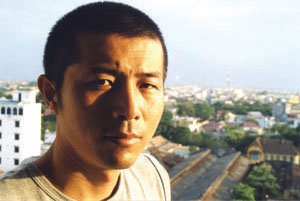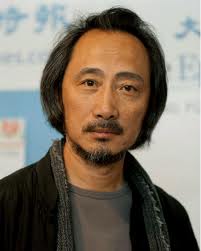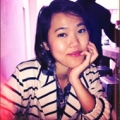You have no items in your cart. Want to get some nice things?
Go shopping
Jung Chang, the celebrated author of Wild Swans and Mao: The Unknown Story, was at the London Book Fair on Monday, April 16, not as a participating author of the Market Focus Programme on China this year, but as a guest of English PEN, a fellowship of writers campaigning for the freedom of expression all over the world.
Jung Chang, like 2010 Nobel Peace Prize winner Liu Xiaobo (currently serving an eleven-year prison sentence in China), London-based novelist Ma Jian (Red Dust, Beijing Coma), 2000 Nobel literature prize winner Gao Xingjian (Soul Mountain, One Man’s Bible) and countless other less well-known poets and writers whose work have been banned in China, were not extended an official invitation by the British Council to appear at the London Book Fair. Many critics, Ma Jian and the exiled poet Bei Ling included, have criticised the British Council for kowtow-ing to the Chinese authorities in its glaring failure to invite dissident and exiled writers, effectively selecting only authors approved by the Chinese government.
Critics have cited the British Council’s cooperation with GAPP-PRC (General Administration of Press and Publication) as particularly abhorrent, since it is the official Chinese government agency responsible for the regulation and administration of all Chinese publishing, including the granting of publishing licenses and the censorship and banning of books. In his critique, Ma Jian calls Liu Binjie, Minister of GAPP, “China’s censor-in-chief” and “the point man” for “silencing” Liu Xiaobo.

In order not to give tacit approval to the omission of important dissident and exiled Chinese writers, English PEN decided this year not to host Market Focus authors at its PEN Cafe Programme, as it usually does. Instead, PEN invited its own guests, including Jung Chang and Bi Feiyu (winner of the 2010 Man Asian Literary Prize for his novel Three Sisters). The latter happened also to be part of the official delegation of authors from China, bestowed the added honour of “Author of the Day” on Tuesday, April 17. An English PEN spokesperson said that PEN had invited Bi Feiyu for an interview because they already had a working relationship with him (they had supported one of his books in the past), and that of course it isn’t the case that if someone’s work hasn’t been banned that they are somehow less worthy as a writer.
The downside of all the spotlight on which authors haven’t been invited to the Fair is that it has led some to dismiss the authors of the Chinese delegation as mere mouthpieces of the Chinese government, but this is probably too simplistic. As such, PEN’s criticism is aimed not so much at the inclusion of the official participating writers, but rather the exclusion of other voices.
In a letter to the British Council on April 10, the Independent Chinese PEN Centre (ICPC) said, “As the official, government approved writers generally represent the government, the official literature allowed by GAPP-PRC is only a very limited part of Chinese literature, mainly representing so-called “socialist literature with Chinese characteristics”. It cannot but reflect far less than a full view of Chinese literature. Chinese literature must include independent literature, beyond official censorship and banning, heretical literature, underground literature, prison literature and exile literature.”

When I caught up with Ma Jian, he said, “The British Council didn’t invite Jung Chang, and this makes us feel humiliated on behalf of unrecognised writers. Because among English readers, or under the umbrella of ‘Chinese writers’, Jung Chang and I are forever Chinese writers. We write about China, I even write my books in Mandarin. On this point I also dislike the attitude of the English. How can they cooperate with a country that is so lowly ranked globally in terms of freedom of expression, 175th out of 179? Do they want the English to learn censorship? Do they want English civilisation to become more dirty?”
Jung Chang’s Wild Swans, her own family saga, celebrates its 21st birthday this year. In her interview with PEN at the Fair, when she was asked what it does for her now, reading it so many years later, she said, “Well, I’m not reading it. [Laughs] I think I’ve written it and it’s been tremendously cathartic for me. It helped me turn a very painful past into memory, which is a luxury that most people in China don’t have, because we were not allowed to think about, to talk about, this period.”
When asked what she thought of her contemporaries who had travelled to London as part of the state-approved delegation, she hastened to say, “I wouldn’t accuse the writers in China because it is very difficult. I mean, you could be sent to prison for over a decade for something you write. If you’re not thrown into prison you might be exiled, you might be forced abroad, in which case you can’t go home. I mean, Ma Jian himself can’t go home. He can’t see his parents, his children can’t see their grandparents, it’s a very, very hard choice to make. Nobody but the most hardened heroes can do this, and not everyone can be a hero. You have to think about your wives and your husbands, your families, your parents… it’s very, very hard. So I feel that we must have a lot of sympathy for them.”
She added, however, “Of course, if you peddle the party line unashamedly, that’s another matter.”
In response to a sceptical member of the audience as to whether really good literature can be created in China under a dictatorial system and a closed society, Jung Chang said, “Dictatorship can produce great literature—not because dictators want great literature, but because the anger, the fury, the repression will inspire great writers. But of course, for most people, censorship and dictatorship is a straitjacket that kills creativity.”
Similarly, when Bi Feiyu was interviewed by PEN, he was asked if he feels free to write whatever he wants to as a writer in China. He seemed to pick his words carefully, saying, “Regarding which parts are off limits, I think I have an idea. Some things I am not free to write about. But at the same time, I am also free. No matter what other people think, I will choose my own way to express what I think. One thing I would like to stress is that we should never underestimate the power of expression by an author.”
I asked Ma Jian, who was sitting in the audience, what he thought of Bi Feiyu’s interview.
He said, “I like Bi Feiyu’s novels a lot, and I can accept his viewpoint on literature. What I don’t quite accept about China’s official delegation of writers is that they tend to avoid some important public topics. For example, when the interviewer asked about the situation of the Chinese delegation and what it means, they make it their own individual problem. They won’t say what the problem is, they won’t tell you what they’re really thinking inside, and this is what I don’t like about them.
“In my opinion, as a writer, besides giving your readers a beautiful story to read, you should offer them some dignity living in Chinese society, by voicing their problems and society’s problems. In England, in Western civilized society, writers have two functions: one is to write a good novel, the other is to write columns for the newspaper to talk about society’s problems. But in China, there is no newspaper, only propaganda. These columnists do not exist in Chinese society.
“So I think it is important that Chinese writers have two wings. You can’t always just use one wing, and think, ‘Oh, I’m not into politics. That’s all nonsense.’ One wing is to write well, and the other wing is to be in touch with society. You have a responsibility to your readers, because you have thoughts, because you have a pen. You can speak out for them.”
For more on this:
Richard Lea's comprehensive piece in The Guardian, 'Is the London Book Fair supporting Chinese censorship?'
A revealing anecdotal piece by Jonathan Mirsky at the New York Review of Books on the reactions of the Chinese delegation when he dared ask them about the absences of Liu Xiaobo and Gao Xingjian.
The Independent Chinese PEN Centre's letter to the British Council lists many writers, poets and essayists who have been overlooked by the organisers of the London Book Fair, drawing attention not to household names that the world is already familiar with, but to those we have never heard of largely because they have yet to be translated into English.
A heads-up to writers and translators: Litro's forthcoming September issue will celebrate China and its stories. Click here if you'd like to submit your work.

About Emily Ding
Emily joined Litro in April 2012 as Literary Editor & Web Designer. She made over the website and introduced new developmental and editorial features to strengthen Litro's online presence. She left her position in January 2013, taking a backseat as Contributing Editor to concentrate on writing. She is a freelance journalist with a special interest in travel writing and foreign reporting (with an inclination for Asia and Latin America), and is now based in Malaysia. English is her native language, but she also speaks Mandarin and Spanish, having spent 2007-08 travelling in Central America.




